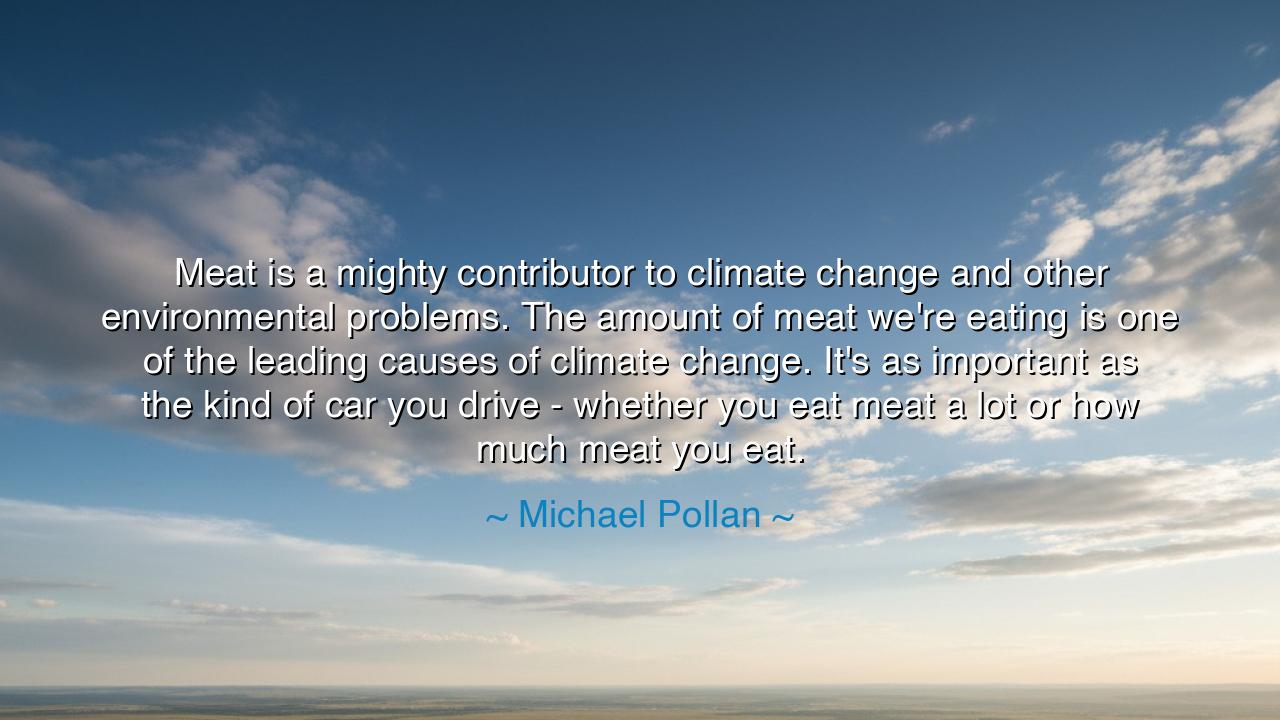
Meat is a mighty contributor to climate change and other
Meat is a mighty contributor to climate change and other environmental problems. The amount of meat we're eating is one of the leading causes of climate change. It's as important as the kind of car you drive - whether you eat meat a lot or how much meat you eat.






Hear the warning voice of Michael Pollan, who looked upon the earth and spoke with the fire of truth: “Meat is a mighty contributor to climate change and other environmental problems. The amount of meat we're eating is one of the leading causes of climate change. It's as important as the kind of car you drive – whether you eat meat a lot or how much meat you eat.” In these words, he reveals a truth that many resist, for it strikes at the heart of daily life and custom. Yet wisdom demands we look with open eyes: what we eat shapes not only our bodies, but the fate of the planet itself.
The mighty contributor he names is not the indulgence of kings alone, but the habit of nations. To produce meat at the scale demanded by modern appetites requires vast lands, cleared of forests that once breathed life into the skies. It requires herds in countless millions, releasing methane, a gas far more potent than carbon dioxide. It requires rivers of water, oceans of grain, and the toil of the earth itself, all consumed to satisfy hunger for flesh. Thus, a meal becomes not just nourishment, but participation in a system that alters the balance of climate.
Pollan reminds us that this choice is as important as the kind of car you drive. We are taught to measure our impact by the vehicles we use, by the fuel we burn, by the energy in our homes. Yet he calls us to see that the fork in our hand bears weight equal to the steering wheel of our car. Every bite is a decision, every meal a contribution to healing or to harm. Few acts are repeated so often in life as eating, and so few acts hold such power for change.
History offers us lessons of societies undone by their appetites. The once-great Maya civilization, it is said, strained its lands through overuse, deforestation, and unsustainable farming. When drought came, the soil could no longer sustain them, and famine followed. Their collapse teaches us that when the balance between hunger and the earth is broken, no wealth or power can save a people. So too today, if we continue to devour without thought, the earth may withhold her bounty.
Yet Pollan’s words are not condemnation alone—they are an invitation to transformation. To reduce meat is not to abandon all joy, but to discover new forms of sustenance: grains, fruits, vegetables, and legumes that nourish both body and planet. Already, nations and families who shift toward plant-based diets find not only environmental relief, but health restored, communities strengthened, and a deeper connection to the rhythms of the earth. Small sacrifices, multiplied by millions, can turn the tide of climate’s fury.
The lesson is clear: climate change is not shaped by governments alone, but by the daily habits of ordinary people. Each of us holds power greater than we know, and with that power comes responsibility. To eat less meat, or to choose it with care, is to take arms in the greatest battle of our time—the battle to preserve the earth for generations to come.
Practical action flows from this truth. Begin with a single day each week without meat, and let it grow. Seek foods that honor the land rather than exhaust it. Support farmers who raise their animals with respect and sustainability. Teach children that what they eat matters, not only for their health, but for the future of the planet. And above all, remember that every meal is a choice between destruction and renewal.
Thus, Michael Pollan’s words stand as both mirror and guide: that meat, in its abundance, is a force reshaping the climate—but that by tempering our appetites, we may bend the course of history itself. Let us be the generation that chooses wisely, that honors the earth at the table as well as in the field, and that leaves to our descendants not a barren world, but one still rich with life, balance, and hope.






AAdministratorAdministrator
Welcome, honored guests. Please leave a comment, we will respond soon